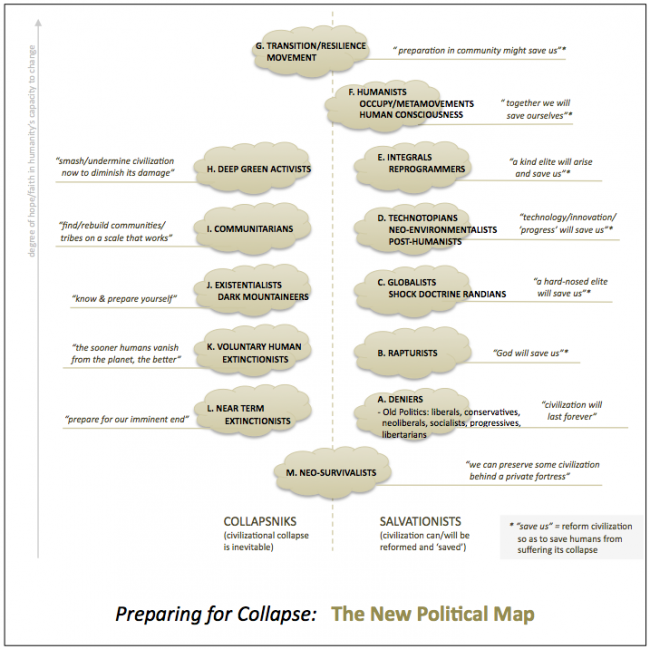My latest article, See No Evil: The Morality of Collapse, is up at SHIFT magazine as part of its sixth edition. Check out the whole magazine! And if you like what you read, or prefer to read hard copy, please get this issue as a digital download (beautiful magazine layout) or sign up for an annual subscription (6 issues).
In this article, I ask the reader to consider these questions:
- Is it acceptable to use violence when pacifism seems inadequate to confront the most devastating aspects of industrial civilization?
- Are large public protests a means of raising awareness and political pressure, or are they a useless distraction from preparing for economic and political collapse?
- Are social justice and equality essential preconditions for collectively addressing issues such as climate change, or would that be just rearranging the deckchairs on the Titanic?
- Would it be a great service or a great disservice to deliberately provoke a collapse of markets and the economy in order to reduce consumption and energy use?
- Is giving up on environmentalism and large-scale attempts in response to climate change, and instead focusing on local initiatives and personal and community preparedness, a realistic and pragmatic strategy, or dangerous, irresponsible defeatism?
Here’s the start of the article, and a link to the rest:
~~~~~

As we wade into discussions about the consequences of collapse, and the most effective ways to become resilient in face of it, most of us avoid discussions about morals (personal standards of ‘right’ and ‘wrong’) and ethics (collective standards of ‘just’ and ‘unjust’ behaviours). As an example, it doesn’t matter whether climate change is human-caused, we assert, we need to focus on how to deal with it, not who to blame for it.
Alas, it is not so easy to avoid the issue, because our worldviews are inevitably rooted in our beliefs, including our moral and ethical ones. So when it comes to preparing for collapse, the different groups who accept that the near-term collapse of industrial civilization is inevitable (or at least requiring immediate and drastic action to avert) possess worldviews that are rooted in different, and I would argue, almost irreconcilable moral and ethical standards. This makes collaboration, or even agreement on what to do, fraught with difficulty, if not impossible.
PS: More creative works coming soon on How to Save the World.





Dave, the questions you raise are important but rarely discussed. People typically seem to adopt one of these political stances (worldviews), creating a silo in which they can consider certain issues and imagine certain scenarios but not see the terrain as broadly as you do. They are ready to blame the others for being incorrect or even immoral, at least as often as they search for common ground and shared strategies.
Some people argue that complexity has peaked and collapse has already begun. As it continues, as systems more obviously break down, my prognosis is that stresses will increase and people with different worldviews will find it even more difficult to tolerate each other or work in concert. Frustration and desperation will lead to more blame and division. Wouldn’t it be nice if I am wrong, that we’ll realize that “all are one” or “we are all in this together” and there is one obvious path through the mess to a brighter future?
Is it possible for us to adopt a broadly held worldview that allows us to relate more harmoniously among each other and with the natural world? What would it take? Could we accomplish it through rational discussion, as implied by your raising those questions? My impression is that worldviews are barely susceptible to change, as suggested by a lot of recent research by psychologists and sociologists. In my view, this is a key reason that the problems of our civilization seem to pose an insoluble predicament.
What might be hopeful signs that I am too pessimistic? One sign would be if many people admitted, as you do, to not being fixed in one worldview, one set of beliefs: uncertainty is healthy! Another sign might be if many people saw some value to others’ points of view, appreciating their different perspectives rather than denigrating them. Meanwhile I look forward to whatever discussion your article might start. Thanks!
Pingback: Experimenting with Friends (AKA, Connecting!) | Impedagogy
Thanks for your openness and honesty in your process, that WILL “save our world” because relationships are the glue, whether among other humans or non-humans. I appreciate that you are personally open to change, not presenting as an abstract concept. As we go into the darkest part of the year and perhaps the darkest part of our fear about the future, it’s great for me to have companions and to clear the energy by transforming it into sharing in this way.